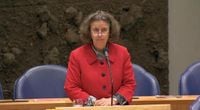In a tense political atmosphere, Dutch Minister of Asylum and Migration Marjolein Faber is facing a potential motion of no confidence in the Tweede Kamer, the lower house of the Dutch parliament, due to her controversial decision not to sign off on royal honors for five volunteers who assisted asylum seekers. This decision has sparked outrage among many parliament members, leading to a heated debate scheduled for April 2, 2025, where Faber must defend her actions.
Faber's refusal to endorse the nominations for the royal honors stems from her belief that the work of these former volunteers, who served at the Central Agency for the Reception of Asylum Seekers (COA), contradicts her migration policy aimed at minimizing the arrival of new asylum seekers and foreigners to the Netherlands. During a question hour on April 1, 2025, she stated, "I want to minimize the arrival of as many new asylum seekers and foreigners to the Netherlands as possible." This stance has drawn sharp criticism from various political factions.
Political commentator Joost Vullings remarked that the royal honors are traditionally seen as a recognition of contributions to society, not a political statement. He noted, "That is appreciation for work you do for society. That should not be politicized." However, Faber's refusal to sign the nominations has been interpreted as a political maneuver, with many accusing her of undermining the unity of Cabinet policy.
In the wake of Faber's decision, opposition leaders have expressed their discontent. D66 leader Rob Jetten labeled Faber as "a disgrace to the office," while coalition partners, including Caroline van der Plas of the BBB and Pieter Omtzigt of the NSC, also voiced their disapproval. Vullings noted that the emotions ran high during the question hour, with some MPs demanding an apology from the minister. "Faber, please act normally. Just say sorry, and we can move on," he quoted the sentiments of frustrated coalition members.
Prime Minister Dick Schoof and Minister of Interior Affairs Judith Uitermark had intended to sign the royal honors, but Faber's refusal has created a rift in the Cabinet. Vullings pointed out that while Schoof and Uitermark signed the honors, the situation has raised questions about the coherence of Cabinet policy. "Everyone in the Netherlands knows that she is actually against those honors," he said, highlighting the discord within the government.
As the debate approaches, the political landscape remains charged. Several parties are contemplating a motion of no confidence against Faber, with CDA leader Henri Bontenbal stating that he would vote against her unless she offers an apology. The coalition is under pressure to present a united front, and Nicolien van Vroonhoven, the NSC's vice parliamentary leader, emphasized the importance of unity in Cabinet policies. She expressed her understanding of the opposition's concerns but also noted that the Cabinet faces significant challenges if unity is not achieved.
Faber's unwavering stance has raised eyebrows among her allies as well. Although NSC and BBB have indicated their support for her, they have also called for her to demonstrate unity within the Cabinet. Van Vroonhoven admitted that she is not entirely convinced by Faber's position, which adds to the tension surrounding the upcoming debate.
During the question hour, Faber was criticized for her repetitive responses. She stated, "As a minister, I am not a rubber stamp machine; if I don’t want to sign for it, then I won’t sign." This assertion drew ridicule from some MPs, with VVD member Thierry Aartsen mockingly recalling the last time he heard such a statement was when he took his daughter to playgroup. Joost Eerdmans from JA21 dismissed Faber's reasoning, arguing that refusing royal honors for five individuals would not decrease the influx of asylum seekers.
The debate on April 2 will be crucial for Faber, as a successful no-confidence vote could result in her dismissal from the Cabinet. This raises questions about the future of the current government, particularly given the ongoing tensions regarding asylum policies and the unity of the ruling coalition.
As the political drama unfolds, many are left wondering whether Faber will soften her stance and offer an apology or continue to hold firm in the face of mounting pressure. The outcome of this debate will not only determine Faber's fate but could also signal broader implications for the Dutch government's approach to asylum and migration policy moving forward.




